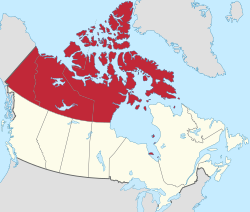
Back Nord del Canadà Catalan باکووری کەنەدا CKB Nordkanada German Kanaday Zımey DIQ Norda Kanado Esperanto Kanadako artikoa Basque شمال کانادا Persian Nord canadien French Noardlik Kanada Frisian צפון קנדה HE
Northern Canada
Nord du Canada (French) | |
|---|---|
 Downtown Whitehorse, Yukon (the territories’ largest city) seen from the east side of the Yukon River | |
 Northern Canada, defined politically to comprise (from west to east) Yukon, Northwest Territories and Nunavut. | |
| Country | Canada |
| Territories | |
| Largest city | Whitehorse |
| Area | |
• Total | 3,535,263 km2 (1,364,973 sq mi) |
| Population (2021) | |
• Total | 118,160 |
| • Density | 0.033/km2 (0.087/sq mi) |
Northern Canada (French: Nord du Canada), colloquially the North or the Territories, is the vast northernmost region of Canada, variously defined by geography and politics. Politically, the term refers to the three territories of Canada: Yukon, Northwest Territories and Nunavut. This area covers about 48 per cent of Canada's total land area, but has less than 0.5 per cent of Canada's population.
The terms "northern Canada" or "the North" may be used in contrast with the far north, which may refer to the Canadian Arctic, the portion of Canada that lies north of the Arctic Circle, east of Alaska and west of Greenland. However, in many other uses the two areas are treated as a single unit.
- ^ "Population and dwelling counts, for Canada, provinces and territories, 2016 and 2011 censuses – 100% data". Statistics Canada. 2017-02-08. Retrieved 2017-02-08.
- ^ "Population by year of Canada of Canada and territories". Statistics Canada. September 26, 2014. Retrieved September 29, 2018.